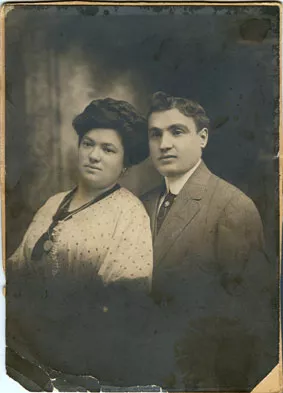Ana, the sister of Devora Finchelstein’s father with her husband Marcu
This is a sister of my wife's father together with her husband. Aunt Ana is on the left, and uncle Marcu is on the right. My wife remembers that aunt Ana was killed during the 1941 pogrom, she was paralyzed and they killed her. The photograph was taken in Iasi, probably around 1920-1930. They had 2 sons, Mendel and Avram. They left to Israel with their father after the pogrom, then we lost all contact with them. Marcu was a traveling salesman, he traveled and brought samples from certain factories, and if he managed to find customers, he went and brought the merchandise. This was one of the typically Jewish trades, it was a pretty honorable trade. Like most women, Ana was a housewife.
Starting with 1937-1938, the Goga-Cuza government and Zelea-Codreanu's legionnaires came to power, so we avoided going to public places. Students enlisted in the legion and Cuza's followers came and broke the windows of Jewish stores. These were awful events. And we had to hide indoors. Mother used to say: 'That's it, don't go out of doors, children. The students are here to break windows.'
Anti-Semitism permeated the air before the war broke out, but we lived in the Jewish quarter and didn't experience these manifestations very directly. If we left the neighborhood, we were verbally abused by some Christian neighbors. We were called 'jidani.' In addition to that, there were also the anti-Semitic publications: "Porunca Vremii" [The Time's Commandment], "Sfarma Piatra" [Break-Stone]. There were 2 Russian bombing runs on the 24th and 26th June 1941. I hid in some nearby cellars on that occasion, but I was very fortunate, as these shelters wouldn't have lasted even if someone had dropped some boulders on them. We learned from our neighbors afterwards that many Jews were taken by surprise by the shelling while they were standing in line at a bakery. It was called "Spicul Verde" [The Green Cereal Ear] and it had been a Jewish bakery before the Romanian cleansing began [after World War II].
The pogrom took place in June 1941. A few Christians lived in the Targu Cucului neighborhood as well, and, before the outbreak of the war, we got along relatively well with them. However, some 2-3 days before the pogrom, many of them left their homes and marked their houses with crosses. We didn't understand at the time what was going on. On 'that Sunday' [29th June 1941], Jewish men were taken out of their houses by force and taken to the Police Precinct. We had heard that Jews would be issued some sort of residence permit by the authorities. As we didn't hurry to get to the police precinct, on Sunday morning about 4 sergeants from the police station and a few civilians entered our house. We were threatened and taken out of the house. My mother and sisters were forced to get out of the house as well, but they were released immediately afterwards. They made father and us, the boys, walk towards the police precinct along Cuza Voda St. in single file and with our hands raised above our heads. Even if this happened 65 years ago, I cannot forget the horror on my mother's face when they took us out of the house, but neither can I forget her joy when 6 out of 7 men returned home. She was the happiest of all mothers.
































